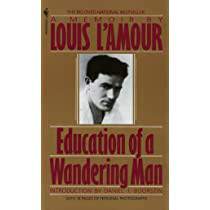The first book I ever read by Louis L’Amour was “Hondo.” I subsequently read “Mustang Man” and then “The Quick and the Dead,” and then I had to collect, invest in and read them. I purchased them all online with the original covers and western pulp artwork. Prior to L’Amour I had read Elmore Leonard’s western books on the old west. I grew up on the cinema of John Wayne/John Ford and Eastwood/Sergio Leone Spaghetti Westerns. The genre stuck with me and I still revisit them to this day.
I wanted to delve deeper into L’Amour, the man and the writer, and came across his memoir “Education of a Wandering Man” and couldn’t put the book down. Here are the lessons I learned from him:
- “EDUCATION IS EVERYWHERE” – Louis L ’Amour was the definition of “voracious reader” and astute bibliophile. Throughout his life he exhibited an abiding appreciation for literature and history. He read and studied from a broad variety of topics and categories including poetry and plays, and his recall and references were astounding. When we speak of someone being “well-read” Louis L’Amour once again fits the definition. As L’Amour once wrote: “…I educated myself, but it has often wandered far afield. Yet, I have ever been a wanderer, drifting through fields of books and finding blossoms wherever they might bloom. Education is everywhere, prompting one to think, to consider, to remember.”
- LOUIS L’AMOUR WAS THE DEFINITION OF “Starving Artist” – He wrote what he knew and personally experienced, and he knew hunger. “Hunger I was to experience many times…” he wrote that on three occasions he went four days without eating anything and then long periods of eating very little. When he writes of hunger, thirst and cold, he lived it. Which brings me to #3…
- He was a Hobo and A Hobo is not a Bum – L’Amour describes his wandering world and America before the Depression. He also makes the distinction that, as a matter or classification, a hobo was not a bum. A hobo was willing to work whereas the bum was not. A “tramp” was a wanderer also, but akin to the bum. Therefore, a Hobo was a wandering worker essential to our nation’s economy.
- He Didn’t Purposely Live a Tough Life – L’Amour did not chose a hard road to gain writer’s experience. He dismissed this as “nonsense.” Jobs were hard to come by before and during the Depression. Period.
- HE WAS A GOOD LISTENER – As much as L’Amour was a loner he was also gregarious and got to know people, and this was one of his greatest assets. He sought out and listened to stories from people that lived in times past. These tales would turn up in works like “Hondo,” “Shalako” and “The Lonely Men.” In every town he encountered stories of Apaches, old Indian scouts and former outlaws or gunslingers. All he had to do was listen.
- HE ALMOST DIED IN THE MOJAVE DESERT – In what has to be one of the most suspenseful tales of L’Amour’s wandering was his survival story in the Mojave Desert. He took a job in the middle of nowhere, Death Valley, and was left with his survival skills and a model-T (in case of emergency and to get back into town). As the story goes, it broke down on the way back into town… in the desert. He finally shows up in town and announces, “I just walked in from Death Valley.” An old man sitting on a stool said,” “You walk in? You got to be crazy.” And damn lucky he was. We would never have known Louis L’Amour the great writer had he not, again, been a good listener to the old man who offered him the job and had he not been a keen observer of his surroundings.
- EDUCATION IS RELATIVE – L’Amour was self-educated as a wandering man. No one had to put a book in his hand. He had a passion to read and educate himself. He preferred libraries over being told what to read. He wrote, “We do not at present educate people to think, but rather, to have opinions, and that is something altogether different.” Good thing he did not live to see social media and the misuse of opinions as knowledge in the current state of our country.
- IDEAS ARE EVERYWHERE – Most successful writers will agree with this thought and principle. There are no dearth of ideas as a writer if you’re open to them and again, listen. It’s like that great moment in Herman Hesse’s classic book where Siddhartha finally tunes into the world. But never forget, we are writing about people. Ideas are important only as they affect people.
- BOOKS AND READING SAVED HIS LIFE – In his own words, “If it were not for books, I should never have been more than a laborer, perhaps killed in a mine disaster, as some of my friends were. Yet, books were there. I could read and had the will to read and the persistence to keep on reading.” I couldn’t agree more. Books throughout my personal life have spoken to me, inspired and educated me, and lifted me up though some of my toughest times.
- HE DIDN’T WRITE WESTERNS – Yes, you read that correctly and may need to re-read that line again and then re-read Louis L’Amour’s books from his perspective. He said that was incorrect. “I am a writer of the frontier, not only in the west but elsewhere…. Much of my writing has to do with men on the western frontier…” Louis L’Amour wrote about survival in new lands and I understand this “wandering man” much better now.











